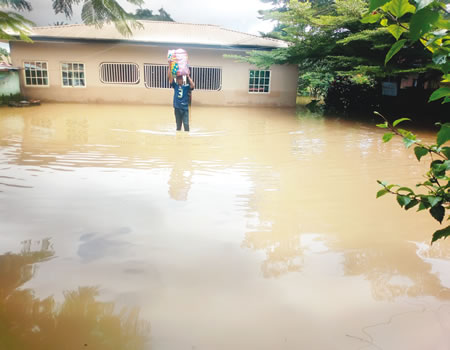Floods, inevitable or not?
According to Professor Mynepalli Sridhar, a consultant and professor of Environmental Health at the University of Ibadan, floods are on the increase. He said this is due to prolonged periods of rainfall that happen as a result of climate change.
“In the last four to five years floods have increased. This is not a technical problem. It is due to human behaviour. Also, because of climate change, rainfall frequency as well as the duration has changed.
“In the past, I used to enjoy the rains in Ibadan and Nigeria generally. Even if it rains everyday, it would last half an hour or one hour and would stop; and the whole environment would be pleasant. But what has been happening in the recent past is continuous rain for one full day or two days! Even in the South-West it is continuous. I can imagine what it is like in the South-East or South-South.”
The South-South and South-East are the regions where Nigeria’s rainforest and coastal regions are located. Rainfall is expectedly heavier in these regions. States in this region like Bayelsa, Delta, Edo and Rivers have been inundated this month.
Professor Sridhar opined that the situation can be managed despite climate change.
From his perspective, rainfall and floods are inevitable. Both are natural events, said the Director of the Institute of Ecology and Environmental Studies, Obafemi Awolowo University, Professor Emmanuel Ofoezie.
“This thing we call flood is when water accumulates in the wrong place. If it accumulates in a place we have no interest, it is not a problem. Floods are inevitable aftermath of rain.
However, “the effect of flood is not inevitable,” he added. “If you plan well, it will not occur in places where it will exert maximum damage.”
Ogunpa channelisation, a success story?
Professor Sridhar noted that state governments had made efforts to build drainages around communities but without successfully dealing with flooding.
“A typical example is Ogunpa channelisation.” Ogunpa is a major river in Ibadan, the Oyo State capital. The river gained notoriety in the 80s, when a major disaster occurred after this river overflowed its banks.
“One day, I happened to be at the bank of Ogunpa River one rainy day. You cannot see water inside the stream. What you see is a mass of floating debris. This is the effect of human behaviour.
“Where Ogunpa begins at around Ashi area, it used to be clean. But as it passes through Bodija and the industrial areas, people throw industrial waste, market waste, human faeces, in it. So, it is no longer clean. Practically, I would call it the sewer of the city of Ibadan.”
On the other hand, Professor Ofoezie saw Ogunpa channelisation as a good example of flood management. “In environmental management, you don’t work to eliminate natural events or their effects, you strive to reduce the effects. If we do something to reduce their effects it won’t seem like a problem again.
“Ogunpa used to be a difficult site in the past. Every year, Ogunpa flood used to come with maximum damage. Action was taken and today, flood still goes through Ogunpa River, but it no longer exerts maximum damage. If the channelisaton by Bola Ige was not done, 70 per cent of the flood in that channel could have been outside the channel.”
Any permanent solution?
Professor Ofoezie agrees there can be a permanent solution, but adds that with floods occurring repeatedly and with early warning signs on regular basis, there is no reason not to prepare.
“Unfortunately, our politicians only respond on the spur of the moment, and for that reason, the floods exert maximum damage. Inability to do the right thing at the right time is the cause of what we are having now.”
He said when rivers overflow their banks regularly, it is best to raise the height of the banks to prevent overflow.
Ofoezie said such action would solve the flooding witnessed along the banks of the River Niger-Benue confluence. This area, covering the Abuja road and a number of communities in Kogi and Benue States, has seen devastating floods this year.
Sridhar said: “Floods happen. But we have enough knowledge and technology to control them. It is only the willingness on the part of the government. If the government can plan very well, why not?”
Professor Sridhar observed that most drainage channels in the country were filled with waste and with nowhere else to flow, the rainwater would cover the streets.
He noted that there could be two types of drainages: one built by government or private hands to cater for domestic waste water from toilets, kitchens and bathrooms. The second is to handle rainwater.
“In most countries, there is a scheme to collect rainwater in a tank. But in Nigeria we don’t have them. This creates a big problem for us.”
He cited the case of a town in South Africa he visited. “The channels are clean and clear. When the rains come, there are no floods.”
He said drainage channels must be properly maintained by regular weeding, and clearing of debris.
Referring to government authorities, he said: “They do one thing: at the time of rainy season, they hurriedly go for one or two weeks to dredge. It’s not helping us. That is a short-term plan, a temporary solution. There should be a continuous, long-term plan to clear weeds and make sure the drainages are properly sloped so the water can flow easily.”
He noted that changing human behaviour was not easy “so ultimately we have to control the flood.”
What can communities do?
In his opinion, there is little individuals or communities can do to remedy the situation compared to government authorities. “Community problems are solved with community money,” Professor Ofoezie said.
“Which community will solve the flood on Abuja Road? That road belongs to the nation, so the nation must handle it. It is government that has the money of the nation.
“There is little that individuals can do, but that does not eliminate corporate responsibility. People can come together to act but government has a major role to play.
“If a wealthy individual or company chooses to use its money to solve community problems and it can be recognised as company tax, then corporate responsibility will increase. But the whole thing still boils down to government.”
“Communities have a role to play. Any drain in front of your house, ensure that it flows,” Professor Sridhar said.
All hands must be on deck. From technocrats to scientists to town planners, said Dr Taiwo Hammed Babatunde of the Department of Environmental Health Sciences, University of Ibadan. “Why should people be allowed to build houses so close to rivers? There should be proper drainage channels,” he added.






